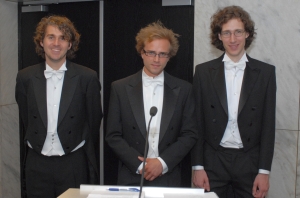In Money we Trust? Trust Repair and the Psychology of Financial Compensations
 Given the widespread use of financial compensations as a response to harm, it seems strange that until now, not much has been known empirically about their effectiveness and their ability to restore trust between people in economic relations. In his PhD dissertation <link erim events _blank>In Money we Trust? Trust Repair and the Psychology of Financial Compensations, Pieter Desmet analyses the psychological processes that victims experience when they are confronted with harm and subsequently, when they receive compensation.
Given the widespread use of financial compensations as a response to harm, it seems strange that until now, not much has been known empirically about their effectiveness and their ability to restore trust between people in economic relations. In his PhD dissertation <link erim events _blank>In Money we Trust? Trust Repair and the Psychology of Financial Compensations, Pieter Desmet analyses the psychological processes that victims experience when they are confronted with harm and subsequently, when they receive compensation.
The findings of his dissertation show that even in economic relations, where violations result in clear, quantifiable harm, the process of repairing trust is not simply determined by the material or financial value of compensation. Rather, this dissertation reveals how immaterial aspects – such as any intent in the violation, whether a compensation was imposed or voluntarily provided, or whether or not an apology accompanied the compensation – are all crucial in determining the actual value that victims attach to a financial compensation. These findings not only provide an important contribution to theories of economic behaviour and our knowledge of trust repair in economic relations, but they can also be useful for decision and policy makers in economic and legal contexts.
Pieter Desmet defended his dissertation on 10 May 2011 at Rotterdam School of Management, Erasmus University (RSM). His promoter was <link people _blank>Prof.dr. D. De Cremer, Professor of Behavioural Ethics at RSM. Co-promoter is <link people _blank>Prof.dr. E. van Dijk. Other members of the Doctoral Committee were Prof.dr. M.H. van Dijke, Prof.dr. D.L. van Knippenberg, and Prof.dr. P.A.M. van Lange.
About Pieter Desmet
Pieter Desmet (1982, Belgium) studied Applied Economics at the University of Antwerp, where he received his diploma of Candidate (BA) in 2002. Becoming more interested in the psychological underpinnings of economic behaviour, Pieter then studied psychology at the Catholic University of Leuven, where in 2006 he obtained a master’s degree in theoretical psychology with a specialisation in social and differential psychology. Under the supervision of David de Cremer & Eric van Dijk, Pieter subsequently conducted his doctoral research on the psychology of financial compensations at Tilburg University and Rotterdam School of Management, Erasmus University. His work has been published or is forthcoming in international journals including Organizational Behavior and Human Decision Processes, Journal of Business Ethics and Personality and Individual Differences. Pieter currently works for the Erasmus School of Law, where he is postdoctoral researcher in behavioural approaches to contract and tort at the Rotterdam Institute of Law and Economics (RILE).
Abstract of In Money we Trust? Trust Repair and the Psychology of Financial Compensations
Despite the importance of trust in economic relations, people often engage in behaviour that may violate their interaction partner’s trust. Given that transgressions in economic relations often result in distributive harm for the victim (i.e. loss of economic resources), a common approach in these relations consists of the transgressor providing a financial compensation to the victim: if a customer has complaints about a product, he is reimbursed; when a company is being sued, it often tries to make a financial settlement with the victims. Strangely enough, the high prevalence of financial compensations as a restorative response contrasts sharply with how little is known about their effectiveness. Can financial compensations actually increase trust again, and what are the factors that determine their effectiveness? By taking an experimental approach, this dissertation aims to provide some first, much needed empirical answers regarding the effectiveness of financial compensations in restoring trust. In this venture, it was not only studied how aspects of the compensation itself (e.g. size) determine their effectiveness, but also how specific characteristics of the violation, the victim and the transgressor impact victims’ reactions to a compensation. The findings of this dissertation show that even in economic relations, where violations have a clear, quantifiable distributive harm, the process of trust repair is not simply determined by the material, financial value of a compensation. Rather, this dissertation reveals how immaterial aspects such as intent in the violation, whether compensation was imposed or voluntarily provided or whether or not an apology accompanied the compensation, are all crucial in determining the actual value that victims attach to a financial compensation.
Download In Money we Trust? Trust Repair and the Psychology of Financial Compensations at RePub


